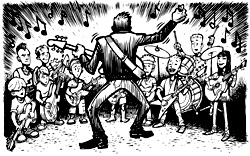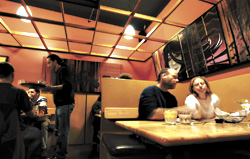“I walked in, was there for about five minutes, walked out, called my boss, and quit my job,” Ben Barnett says. He is recalling his first visit to the Portland School of Rock, an outpost of the Philly-founded institution that inspired the Jack Black movie of the same name and was the subject of Rock School, a documentary starring Paul Green—the school’s unforgettable founder—in all his aggressive, wild-eyed intensity.
Under the Hawthorne Bridge, in an industrial warehouse space by the Willamette River, is where Barnett has been teaching kids to play guitar since last June. Right now, however, he’s on the phone with Domino’s. They’re offering the 3-for-5 deal right now, and he’s going to need all the pizza he can get: It’s a Wednesday and he’s about to be swarmed by students armed with instruments, ready for their after-school music lessons. But this won’t be any band-geek parade of trumpets, trombones, and clarinets. Rather, they’re a stream of bright-eyed, floppy-haired kids clutching electric guitars and drumsticks. Nor will they be rehearsing “Ode to Joy.” Instead, they’ll be practicing slippery Def Leppard guitar solos and hardcore MC5 riffs.
The first time Barnett experienced the School of Rock, he had been working in a coffee shop, reassessing what direction he wanted his life to take. After spending more than a decade making records and touring nonstop with his band, Kind of Like Spitting, as well as the Thermals and John Vanderslice, he had reached a sort of impasse.
“I couldn’t believe after everything that I had done as a musician that this is where I had ended up at 32 years old. Something had to change,” Barnett says. “I’m not a God guy, but as far as the universe providing, [School of Rock] was it for me.”
After filling in as a guitar instructor at the school’s intensive summer-camp program, Barnett was asked by the school’s music director, Carl Hinds, to take on the role of lead guitar instructor. “Do you know how proud I am when [Hinds] introduces me as the lead guitar instructor?” he says incredulously.
Barnett has made Hinds proud as well. On Jan. 6, he’ll begin his new job as music director at his very own School of Rock on Lake City Way in Seattle, the city he calls “the pinnacle of Northwest culture.”
The Seattle School of Rock is the 43rd branch to be launched since the concept was born 10 years ago (after Green tapped his guitar students for a gig when his own band was unable to make it). Six months later, the Philadelphia Paul Green School of Rock played its first official show, an ambitious one: Pink Floyd’s The Wall, in its entirety. Playing that album live is now, almost religiously, the inaugural show for each school that opens across the country, including the Seattle school.
“The musicality on [The Wall] is incredible at points, but there are a lot of places where beginners can play on it, too,” Hinds explains of the show. “It’s completely ambitious, but breathtaking to see.”
The structure of the Seattle school is consistent with the others: kids ages 7–18, of all skill levels, are able to join at any point throughout the year. The curriculum includes a 45-minute, one-on-one lesson each week, along with a three-hour rehearsal where they fine-tune the group/band performances (which will eventually be played in public venues). The themes of these performances include L.A. vs. British metal; the Beatles; Best of the ’90s; Jimi, Jim, and Janis (the work of Hendrix, Morrison, and Joplin, respectively); Sabbath; Zeppelin; and more.
While each School of Rock is required to teach these fundamentals of rock ‘n’ roll, it does allow for flexibility with the content. For example, Barnett says that when his Seattle branch delves into Punk Rock 101, they will cover the basics (Sex Pistols, Black Flag) as well as the genre’s lesser-knowns.
“We try to cover and expose stuff that might otherwise get lost,” he says. “I mean, how can these young women in the program not know about Bikini Kill or not know about Team Dresch?”
At the Portland branch, he had been given the freedom to curate and direct a show specific to that city’s scene. There, the kids learned and performed everything from the Shins’ “New Slang” to Pavement’s “Cut Your Hair” (for which former frontman Steven Malkmus joined them onstage). Considering the wealth of music this city has nurtured, Barnett aims to replicate a Seattle version of the show at the new branch.
While the School of Rock teaches only material by other artists, the students are encouraged to express themselves creatively outside of class by forming bands of their own (the school even offers a few practice spaces for student bands). And though the discovery of rock music has long been associated with parental disapproval, Barnett has witnessed the opposite occurring at the School of Rock.
“The parents stay hip to what the kids are into,” he says. “They support them at the shows, relate to them on other levels, so that when other issues come up in their lives, they can relate to them. It creates stronger relationships all the way around, and I think the world needs a lot more of that. Like my father? I haven’t talked to him in 13 years, and he’s never heard me play. I would kill to have [had] my dad come and see me play when I was 14. He never did. So, I get to be that guy I always wished I knew when I was that age.”






